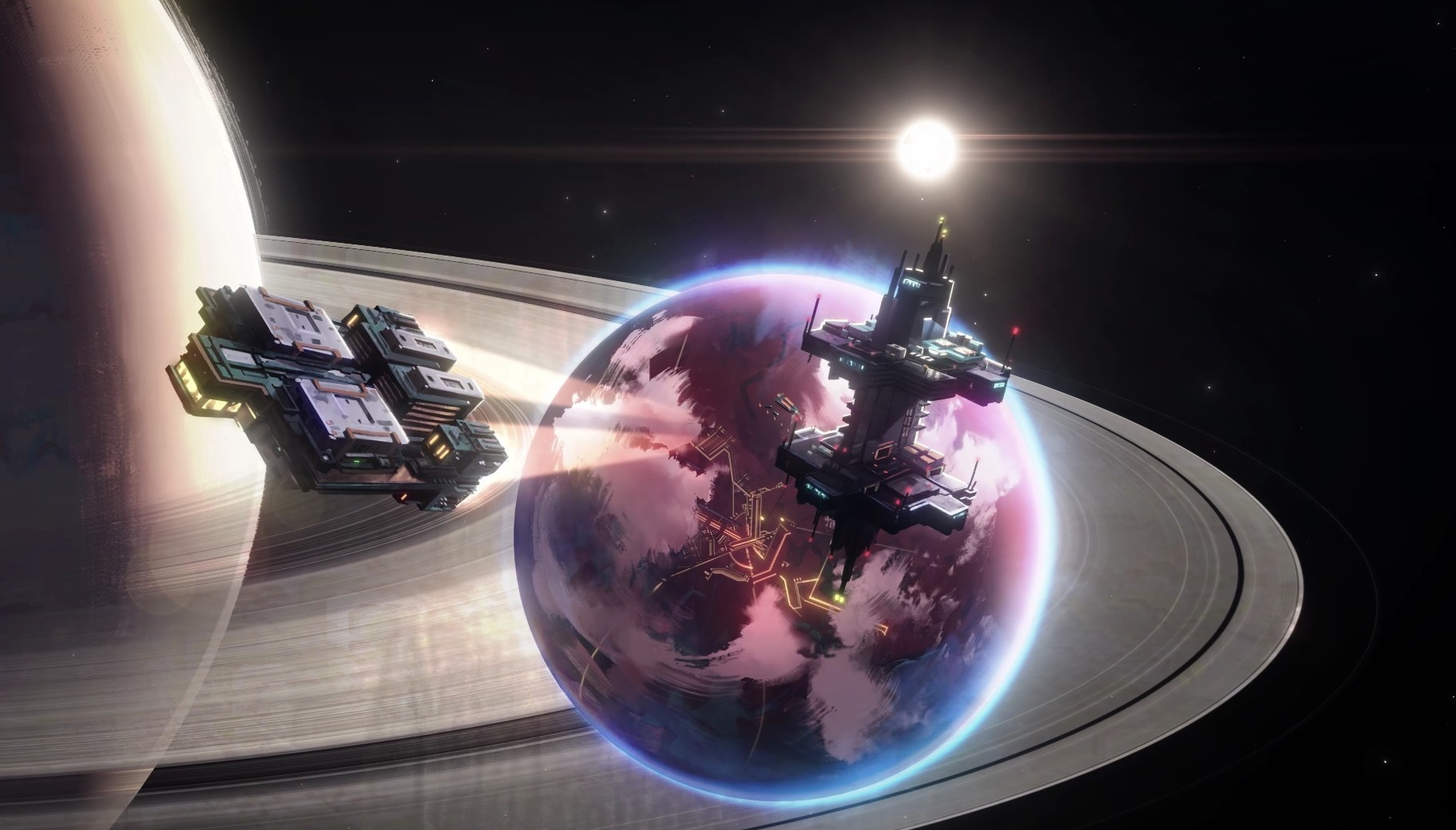Our Verdict
Industries of Titan starts strong and has some bold ideas, but they just don't really go anywhere.
PC Gamer's got your back
What is it? A corporate city builder set on one of Saturn's many moons.
Expect to pay: £23/$30
Release date: Out now
Developer: Brace Yourself Games
Publisher: Brace Yourself Games
Reviewed on: RTX 3080 Ti, Intel i7-8086K, 16GB RAM
Multiplayer? No
Link: Official site
After 100 of my colony's citizens died due to the toxic fumes and quite a lot of fire, I regretted naming my Industries of Titan corporation PC Gamer Dot Com. It's just not good for the brand. But a loss like this, which would be considered a catastrophe anywhere else, is more like misplacing a box of staples on Saturn's miserable moon.
Nobody seems to be that bothered by death in the corporate realms of the far-flung future. People are quickly replaced, inspiring a brutal kind of pragmatism that sees all other concerns secondary to earning a seat on the corporate council. It's all about getting to that point where you can just spend all day playing space golf and not paying your taxes.

That lofty dream begins with a one-floor HQ. Unlocking additional buildings requires an abundance of cash and resources that you won't yet have, but not to fret—you can build everything you need to jumpstart your economy inside your HQ. Devices can be plonked down that provide energy, fuel, housing, storage and income, using resources gathered from the surrounding area.
Sending employees out to scavenge in the ruins of a failed Titan colonisation effort will net you the necessary minerals and isotopes, though you can also harvest resource fields and eventually plonk down mines. These ruins are everywhere, so you're effectively building your shining, neon city of tomorrow in a monolithic graveyard, looting the corpses of these titanic structures to build new ones. It serves as a constant reminder of the cost of failure, while also blessing the game with a unique, post-apocalyptic aesthetic.
Star citizens
Ruins contain relics as well as resources, but you can't harvest both from a single building. Relics are used to advance down the randomised tech tree—mostly containing extremely handy bonuses, like dramatically reducing energy requirements for certain buildings—and brainwash citizens into becoming employees. Citizens just mope and watch ads that make you cash (until you unlock offices), while employees do everything else. Your ruin expeditions are limited by the influence you spend to unlock new tiles—a currency that's also required for seducing migrants over to your corporation. So something as simple as choosing to exploit a ruin feeds into a whole web of decisions, creating friction and new opportunities.
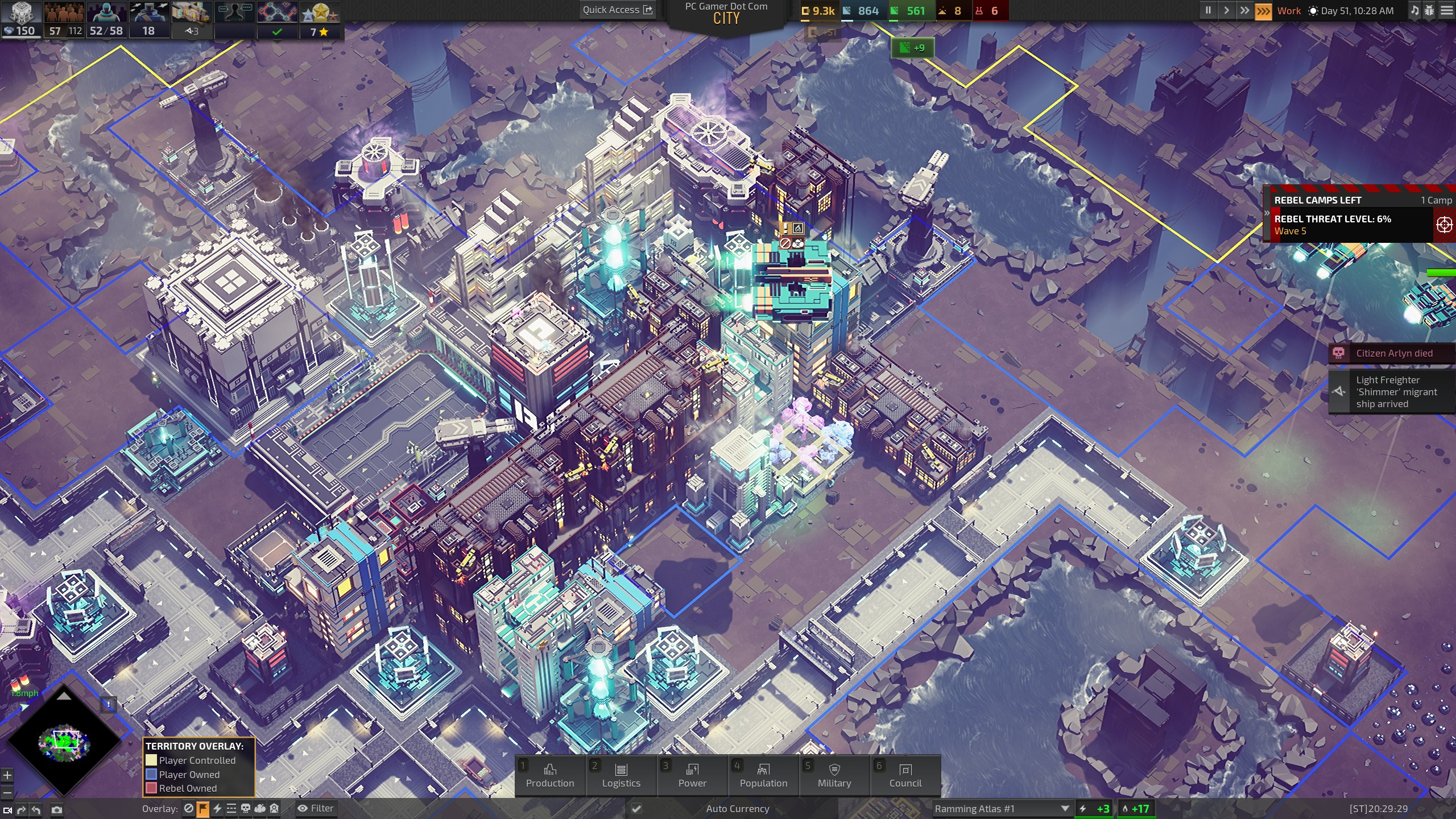
As you accumulate more resources and credits, you can start to build factories that give you more places to build interior devices. Since space is at a premium both inside and outside, at first you'll spend a lot of time trying to maximise the space that you start with. Thankfully, you can also build up, adding new floors to your buildings, or you can connect two adjacent ones together to get a small but welcome bump in floor space. There's always a sense that, even when you're faced with a lot of obstacles, you have a lot of ways around them.
Interior construction is a bit fiddly thanks to the devices having a wide range of shapes and sizes, but there's joy to be found in the novelty of a city builder letting you actually go inside your buildings to muck around with them. It's just a shame that you'll see everything you can do with them straight away. Once you've saved a few blueprints, you'll likely never venture inside them again, even in future missions. What feels like the game's biggest hook just becomes an afterthought.
While interiors largely become completely irrelevant, the factories themselves continue to be important. This is true even after you've unlocked some more buildings, many of which are essentially powerful versions of devices. See, there's a price for that power, both in terms of the upfront cost of credits and resources, and the ongoing drain on your economy and workforce.
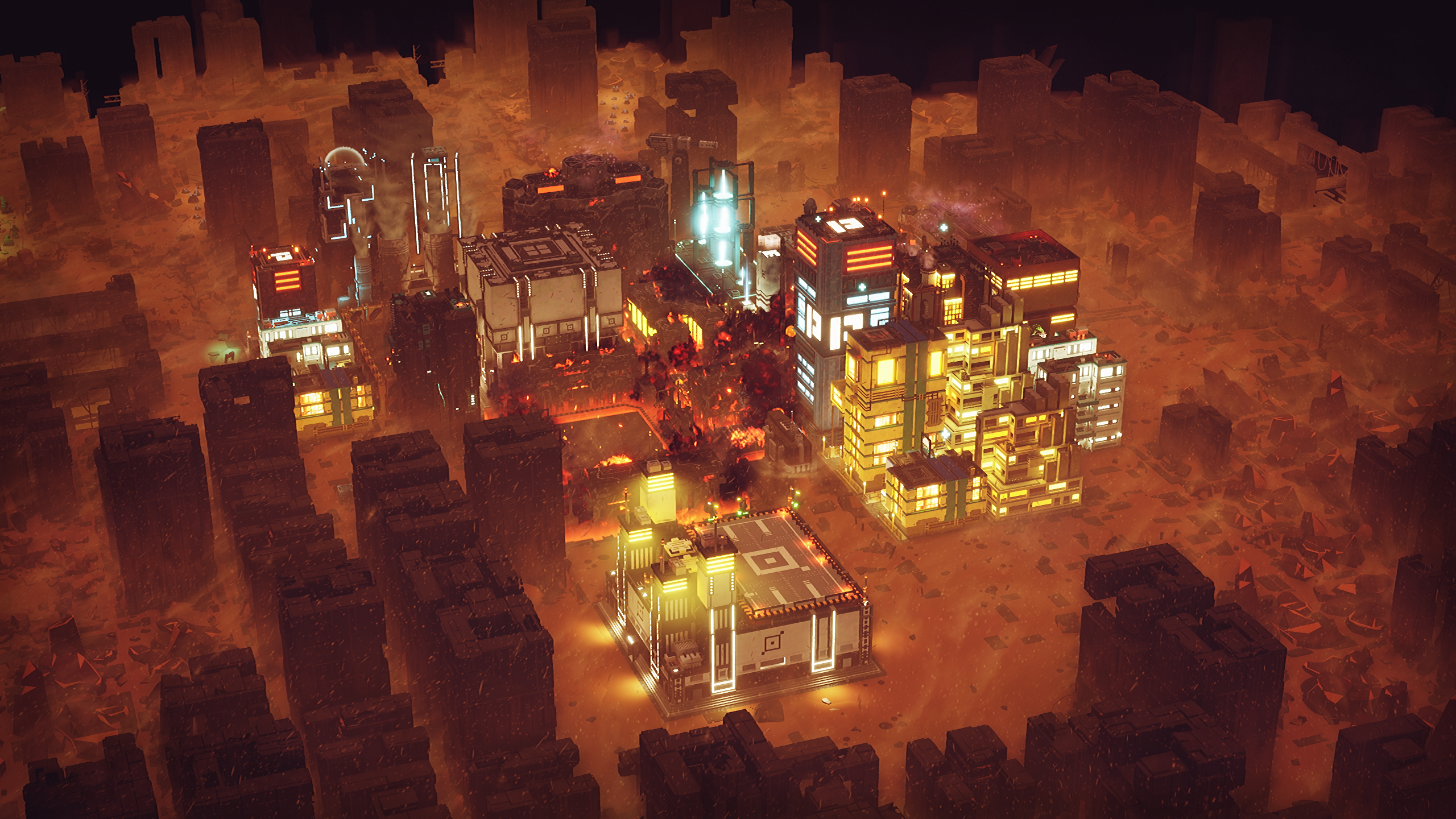
A factory full of fuel generators can be entirely unmanned and doesn't reduce the surrounding habitability, but the standalone fuel turbines need to be staffed, and nobody likes living near them. Which is best depends on a lot of constantly changing factors, and I enjoyed having to make these considerations every time I needed to expand my infrastructure, but really this was more of an internal motivation. As much as efficiency is often encouraged, it's not essential, and you can complete every mission by half-arsing it.
Refined palate
There's one kind of interior device that unlockable buildings can't replace: processors and their accompanying modules. This is where your diligent, brain-washed employees will upgrade resources. Higher tier resources give you more construction units, and the things you build with them are more powerful. It's a crunchy system that feels like the foundation of a larger Anno-style production network that sadly never appears. As you expand outwards, the demand for more isotopes and minerals grows, but the system never gets any deeper than what you see in the first half-hour.
Industries of Titan really starts to lose its edge pretty quickly, and then transforms into a more familiar kind of city builder. With one mission under your belt, there's surprisingly little for you left to discover. But some of the systems remain engaging, regardless.
Pollution is a particularly interesting and potentially fatal obstacle. Deaths aren't a major concern, because people are so easy to replace, but fewer migrants will be available if they start hearing about the polluted hellscape you've created. "Come to Titan and we'll give you cancer" is not a very catchy slogan. You have access to air purifiers and huge fans to help deal with this, but these structures also affect the xethane gas that's essential to keeping your energy-supplying buildings and devices working. Despite Industries of Titan not being especially demanding, this is a tricky balancing act that requires plenty of planning and the ability to quickly adapt as you reconfigure your infrastructure to avoid a deficit.
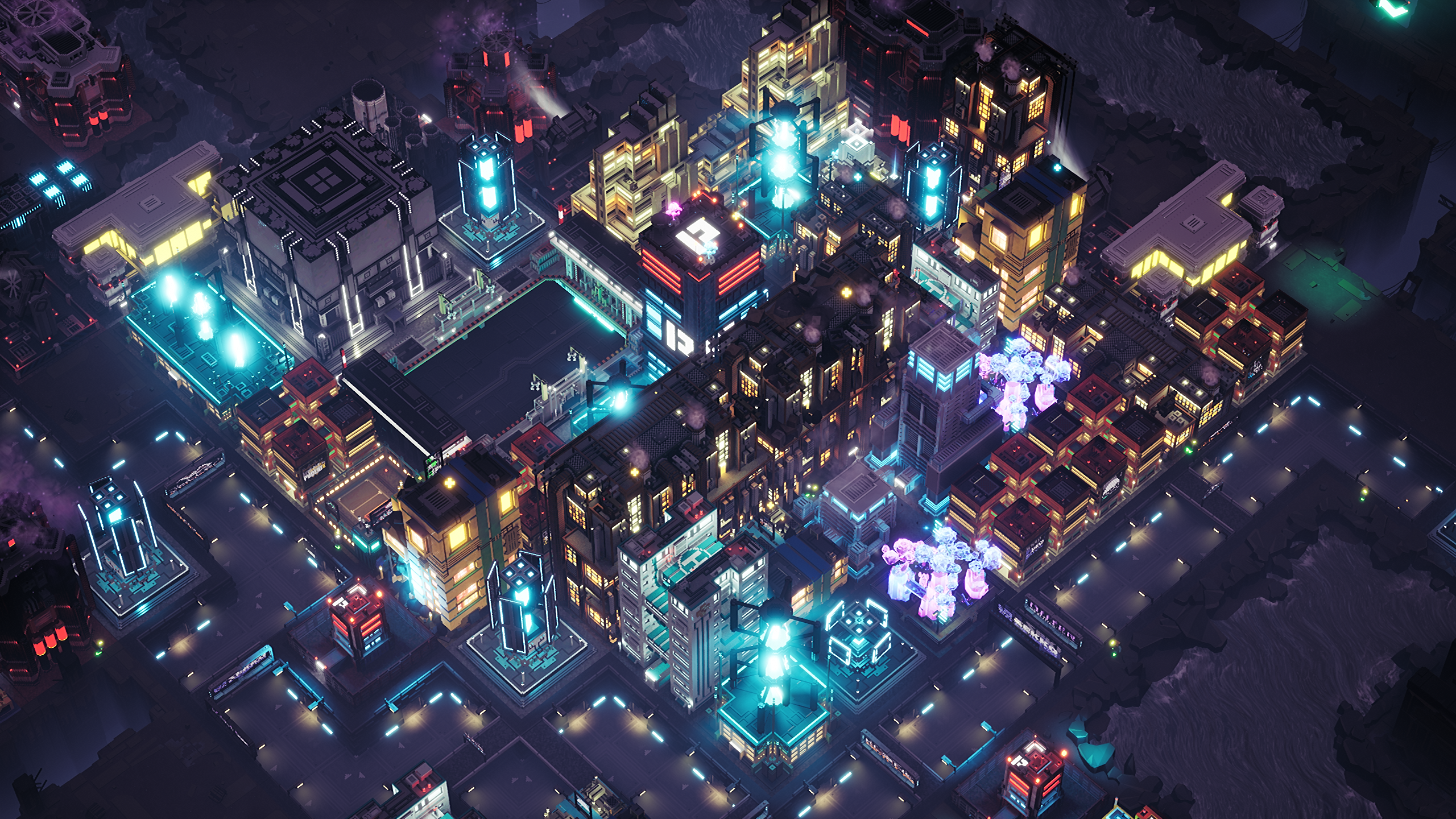
You can also design ships and fight off rebel invasions, but this is a system I could have done without. It's nice to see someone trying to stop corporations wrecking another world, but it ultimately adds very little. Ships are costly and a faff to build, which their lack of utility doesn't justify. You can't even select multiple ships, instead needing to give them orders one by one. But then again, that's less of a problem when combat amounts to simply clicking on the enemy.
I mostly relied on ground-based turrets to protect all my riches and, to a lesser extent, my employees. You'll still need ships if you want to take out the rebel camps, but wiping out rebels isn't compulsory. Defeating them is a doddle, but once you've done that there's absolutely no reason to keep the ships. It just doesn't feel very well thought out.
Scuttle the ship
What bugs me is that a lot of effort must have gone into designing this layer. There are a lot of different ship hulls, a dedicated shipyard, and even a loose progression system where more ship devices can be unlocked in the tech tree. All the design work and testing could have been better used fleshing out the building interiors and production chains. You know, the actual city builder bits. Brace Yourself Games cut some really interesting things from its roadmap, and it boggles the mind that this stuck around.

There's a zen mode that removes rebels, but the meat of Industries of Titan is the campaign. It's poor. To get a seat on the council you have to take over some corporate sectors, which you can only do by conquering a bunch of other sectors. You're looking at around five missions to reach the end. That doesn't sound like very many, but god it's a slog. It doesn't matter if you're on an arid map where you're constantly bombarded by sandstorms or a chilly map teeming with rebel bases, the experience is largely the same.
What's unusual about Industries of Titan is that earning a seat on the council has nothing to do with running a successful business. Instead you've got to complete a bunch of arbitrary and sometimes downright asinine objectives to earn stars and rank up. Bronze rank allows you to complete the mission, but higher ranks reward you with more favour, which can be spent on bonuses in the next mission.
It's difficult to express how much I loathe these objectives, and how much they utterly ruin the pace of the game. Every single mission I played was artificially stretched long after I'd already designed an efficient, sustainable colony and smashed the rebels. "Oh, you're raking it in and all your employees love you? Too bad, you need to build 17 more hospitals." And since these objectives are pre-determined, it's rare that they encourage you to solve any problems relevant to your situation. You can skip a couple of objectives even if you're looking for the highest rank, but you'll still have to dedicate time to a lot of completely ridiculous demands.
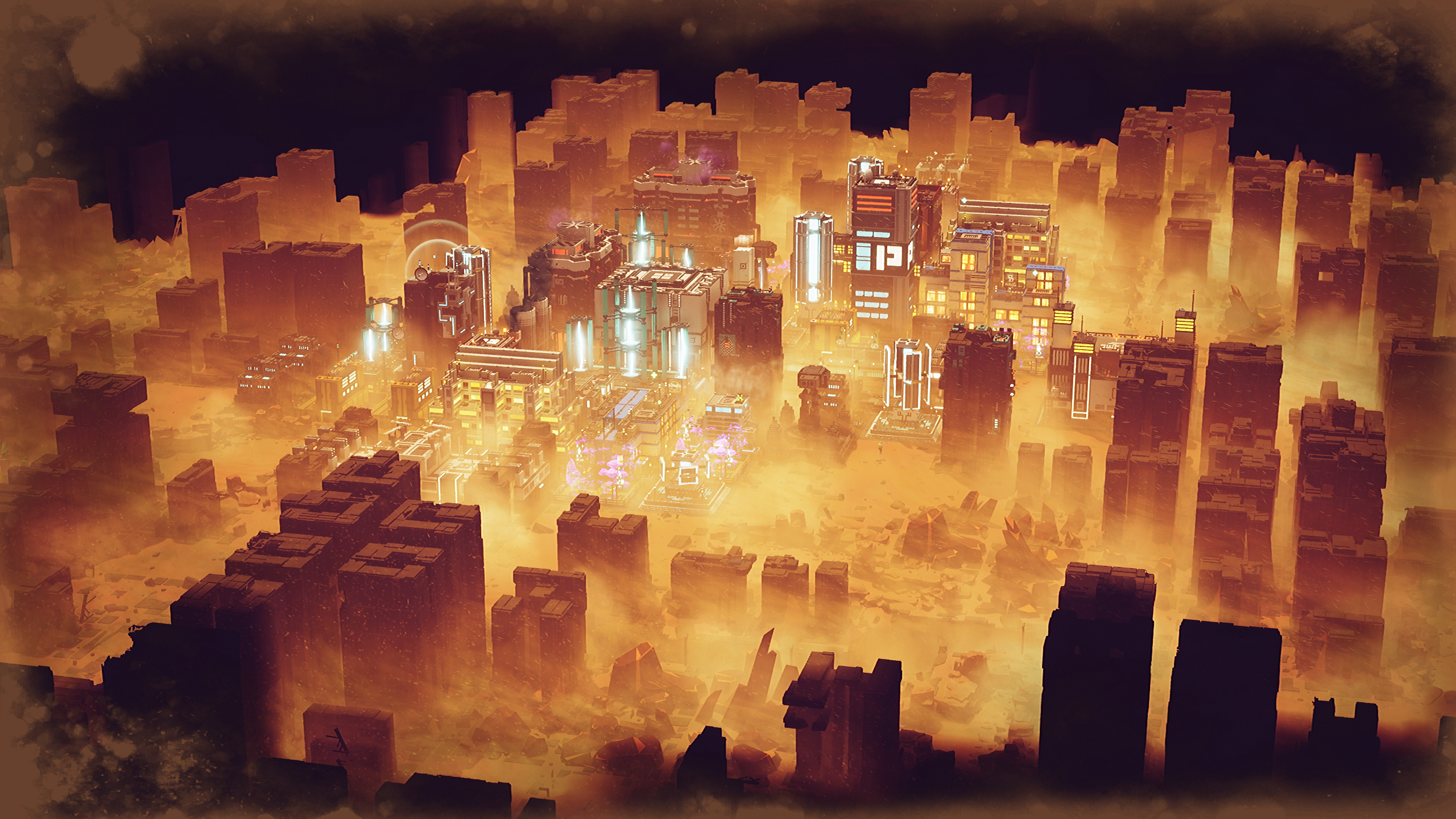
To complete my final mission, I ended up building 14 influence-generating obelisks, despite the fact that I was almost always at the influence cap. And of course those obelisks demanded energy, so I had to expand my infrastructure to construct a bunch of useless buildings that I'd never use because I was about to finish the campaign. I got to join the council because I jumped through some stupid hoops, which undermined my victory a bit. It felt like a hazing ritual—a bunch of rich dickheads laughing at the obelisk guy.
Industries of Titan may have concluded on a sour note, but much of my time was spent contentedly fiddling with my city's infrastructure and solving logistical conundrums. When you get in the zone, hunkering down while you tweak and expand, it can be extremely satisfying. But by failing to develop its initially compelling ideas, instead pushing dismal fights and exhausting objectives, it loses its way. In the end, I was relieved to tender my resignation.
Industries of Titan starts strong and has some bold ideas, but they just don't really go anywhere.

Fraser is the UK online editor and has actually met The Internet in person. With over a decade of experience, he's been around the block a few times, serving as a freelancer, news editor and prolific reviewer. Strategy games have been a 30-year-long obsession, from tiny RTSs to sprawling political sims, and he never turns down the chance to rave about Total War or Crusader Kings. He's also been known to set up shop in the latest MMO and likes to wind down with an endlessly deep, systemic RPG. These days, when he's not editing, he can usually be found writing features that are 1,000 words too long or talking about his dog.
